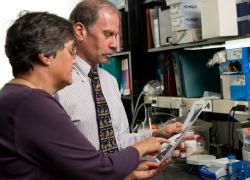Research Programs

Background and History
The Gastroenterology and Hepatology Unit has a rich legacy of research contributions in the broad domains of digestive disease. Pioneering studies at the University of Vermont have led to breakthroughs in colon cancer genetics, development
of treatments of inflammatory bowel disease, lifesaving technologies for jaundice in the newborn, understanding of the natural history and biology of autoimmune hepatitis, and antiviral therapy for hepatitis C.
The tradition of
excellence continues today. Faculty members are actively engaged in a variety of research areas, which is facilitated by robust collaborations with faculty outside the Unit in the Departments of Pathology and Laboratory Medicine, Radiology,
and Surgery. Our work is strengthened by resources available through the Jeffords Institute for Institute for Quality, Office of Clinical Trials Research, the core facilities of the Larner College of Medicine, and the School of Engineering
and Mathematical Sciences. Fellows in the Unit play important roles in our program. They spark health-related questions that are the engines for the best forms of clinical research, and they are our ambassadors through project
presentations at Digestive Disease Week and other national meetings.
Current Areas of Research Interest
Research in the Unit is dynamic and always evolving. What follows is a sample of currently active projects at the time of this writing.
- Gary Mawe is elucidating molecular pathways involved in disorders of gut motility, such as inflammatory bowel disease and irritable bowel syndrome.
- Joseph Frasca, M.D. is mining a large inflammatory bowel disease database to examine the impact of patient-related factors on treatment response and outcomes.
- Doris Strader, M.D. is investigating esophageal motility disorders
- Eric Ganguly, M.D. is studying biological and endoscopic determinants of interval colon cancer following colonoscopy.
- Steven Lidofsky, M.D., Ph.D. is examining geographical disparities in management of hepatocellular carcinoma.
- Richard Zubarik, M.D. is investigating the utility of biomarkers for pancreatic cancer screening and surveillance in high-risk patients and is
also spearheading the development of innovative technologies for endoscopic intervention.
- The Unit remains heavily involved in research related to hepatitis C (Nicholas Ferrentino, M.D.,Steven Lidofsky, M.D., Ph.D., Doris Strader, M.D.), which is currently focused on electronic tools to improve overall disease
outcomes. The emergence of nonalcoholic fatty liver disease as a significant health problem has been a driving force projects (led by Steven Lidofsky) that span screening and treatment.
For a list of currently active clinical trials, please view Clinical Trials page